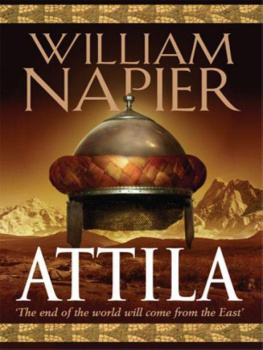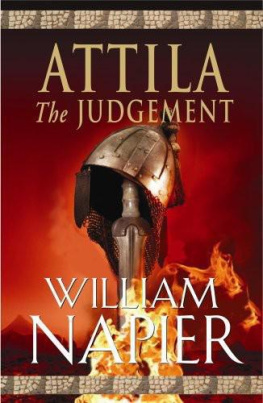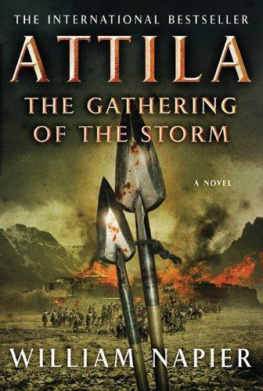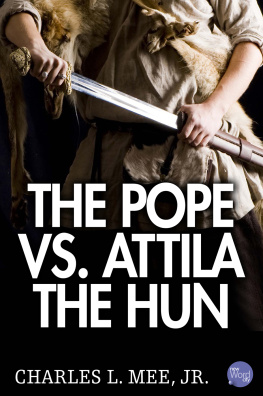William Napier - Attila
Here you can read online William Napier - Attila full text of the book (entire story) in english for free. Download pdf and epub, get meaning, cover and reviews about this ebook. year: 2009, publisher: Orion Books, genre: Art. Description of the work, (preface) as well as reviews are available. Best literature library LitArk.com created for fans of good reading and offers a wide selection of genres:
Romance novel
Science fiction
Adventure
Detective
Science
History
Home and family
Prose
Art
Politics
Computer
Non-fiction
Religion
Business
Children
Humor
Choose a favorite category and find really read worthwhile books. Enjoy immersion in the world of imagination, feel the emotions of the characters or learn something new for yourself, make an fascinating discovery.
- Book:Attila
- Author:
- Publisher:Orion Books
- Genre:
- Year:2009
- Rating:4 / 5
- Favourites:Add to favourites
- Your mark:
- 80
- 1
- 2
- 3
- 4
- 5
Attila: summary, description and annotation
We offer to read an annotation, description, summary or preface (depends on what the author of the book "Attila" wrote himself). If you haven't found the necessary information about the book — write in the comments, we will try to find it.
Attila — read online for free the complete book (whole text) full work
Below is the text of the book, divided by pages. System saving the place of the last page read, allows you to conveniently read the book "Attila" online for free, without having to search again every time where you left off. Put a bookmark, and you can go to the page where you finished reading at any time.
Font size:
Interval:
Bookmark:
ATTILA
Attila the Hun Book One
William Napier

Orion Books Ltd,
Orion House, 5 Upper Saint Martins Lane London, WC2H 9EA
www.orionbooks.co.uk
Table of Contents
Acknowledgements
Praise for Attila:
[a] rip-roaring account of the boyhood of Attila the Hun, a tale jam-packed with epic set pieces, bloody battles, a fair bit of history and the requisite lusty interludes [a] gripping novel Daily Mail
William Napier has a genius for making the blood-dimmed chaos of ancient history into the very stuff of thrilling narrative
Tom Holland, author of Rubicon and Persian Fire
He brings the fifth century back to horrible life and convincingly sets up the major players of the time for the turmoil that will have the world rocking on its axis Attilas a winner Sunday Sport
William Napiers rattling good yarn Napier tells a great story, complete with smells and sounds, and lots of gore. The battle descriptions are particularly good I couldnt put it down
Fiona Hook, Big Issue
This is the first novel in the Attila the Hun trilogy. William Napier is the author of one previous novel, Julia. He lives in Wiltshire and travels widely.
An Orion Books ebook
First published in Great Britain in 2005 by Orion Books
This ebook first published in 2009 by Orion Books
William Napier 2005
The right of William Napier to be identified as the author of this work has been asserted in accordance with the
Copyright, Designs and Patents Act 1988.
All rights reserved. No part of this publication may be reproduced, stored in a retrieval system or transmitted in any form or by any means, without the prior permission in writing of the publisher, nor to be otherwise circulated in any form of binding or cover other than that in which it is published without a similar condition, including this condition, being imposed on the subsequent purchaser.
A CIP catalogue record for this book is available from the British Library.
eISBN : 978 1 4091 1672 1
This ebook produced by Jouve, France
The Orion Publishing Group Ltd
Orion House
5 Upper Saint Martins Lane
London, WC2H 9EA
An Hachette UK company
www.orionbooks.co.uk
In memory of Steven Thorn
1965-2003
best of flatmates, best of friends
LIST OF PRINCIPAL CHARACTERS
The Roman Empire, c. AD 400
Characters marked with an asterisk were real historical figures. The rest might have been.
Atius* (pronounced Eye-EE-shuss) - born 15 August, 398. The son of Gaudentius, Master-General of Cavalry, in the frontier town of Silestria, in modern-day Bulgaria
Attila* - born 15 August, 398. The son of Mundzuk, the son of Uldin, King of the Huns
Beric* - a Vandal prince
Bleda* (pronounced BLAY-da) - the older brother of Attila
Cadoc - the son of Lucius
Claudian* - Claudius Claudianus, an Egyptian, born in Alexandria. A favourite in the court of Honorius, and regarded by some as the last of the great Roman poets
Eumolpus* - a palace eunuch
Galla Placidia* (pronounced Galla Pla-SID-ia) - born 388. The daughter of the Emperor Theodosius, sister of the Emperor Honorius, and mother of the Emperor Valentinian
Gamaliel - wanderer, wise man, holy fool
Genseric* - a Vandal prince
Heraclian* - Master-General of the Roman Army in the West after the death of Stilicho
Honorius* - born 390. The son of the Emperor Theodosius, and himself Emperor of Rome 395-423
Little Bird - a Hun shaman
Lucius - an ordinary Roman officer, British by birth
Marco - a Roman centurion
Mundzuk* - the elder son of Uldin, and briefly King of the Huns
Olympian* - a palace eunuch
Orestes* - a Greek by birth, and the lifelong companion of Attila
Priscus of Panium* - a humble and unremarked scribe
Ruga* - the younger son of Uldin, and King of the Huns from 408-441
Serena* - wife of Stilicho
Stilicho* (pronounced STIL-i-ko) - half-barbarian by birth, and Master-General of the Roman Army in the West until his murder in 408
Uldin* - King of the Huns until 408


PROLOGUE

The Monastery of St Severinus, near Neapolis, ad 488
My father always told me that there are two things you need to be a great historian. You need to be able to write, he said, and you need to have things to write about. His words sound ironic to me now. Yes, father: I have things to write about. Things you would hardly believe.
I have the greatest and most terrible of stories to tell. And in these dark ages, when the skills of the historian are rare to find, I may very well be the last man on earth who can tell it.
My name is Priscus of Panium, and I am nearly ninety years old. I have lived through some of the most calamitous times in the history of Rome, and now that story is ended, and Rome is done. Titus Livy wrote about the Founders of Rome. It falls to me to write of the Last Defenders; and of the Destroyers. It is a story for bitter winter nights; it is a story of horror and atrocity, shot through with saving gleams of courage and nobility. It is in many ways an appalling story, but it is not, I think, a dull one. And although I am very old, and my palsied hand shakes as it holds the pen over these vellum pages, nevertheless I believe I have the strength remaining in me to tell the final chapters of the tale. Strange as it may seem, I know that when I have written the last word of my tale my time on earth will be done. Like St Severinus, I know the day of my own death.
St Severinus? He is being buried, even as I write, in the chapel of this monastery where I scratch out my last days. He lived as a missionary, a holy man and a servant of the poor, in the province of Noricum, beyond the Alps, and he played an unexpected role in the last days of Rome. He died some six years ago, but only now have his devoted followers been able to bring his body back over the high Alpine passes, and down through Italy, miracles attending his progress every step of the way. Who am I to question such miracles? We live in mysterious times.
This monastery where I now live, on the sun-warmed coast near Neapolis, cared for so kindly by monks whose faith, I confess, I hardly share, this monastery itself, now dedicated to St Severinus and to the religion of Christ, has a strange and instructive history. Once it was the luxurious seaside villa of Lucullus, one of the great heroes of republican Rome, in the first century before Christ; in the time of Cicero, Caesar, Pompey and the rest. (There were giants on the earth in those days.) Lucullus was celebrated above all else for his brilliant victory over Mithridates, King of Pontus; although epicures have always joked that, as achievements go, they much more admire his introduction into Italy of the cherry.
After Lucullus death, the villa passed through various hands, until finally, by one of the many strange ironies that so delight Clio, the muse of history, it became, after his forced abdication, the residence of the last Emperor of Rome: little, golden-haired, six-year-old Romulus Augustulus.
Today it is home to over a hundred monks, who are now standing round the coffin containing the mortal remains of their beloved St Severinus, their voices rising to heaven in their sad, melodious chanting, amid the smoke of incense and the glitter of sacred gold. It was Severinus who told Odoacer the Ostrogoth that his destiny lay in the sunlit lands to the south. It was Odoacer who deposed the last emperor, Romulus Augustulus, disbanded the Senate, and declared himself the first barbarian King of Italy.
Font size:
Interval:
Bookmark:
Similar books «Attila»
Look at similar books to Attila. We have selected literature similar in name and meaning in the hope of providing readers with more options to find new, interesting, not yet read works.
Discussion, reviews of the book Attila and just readers' own opinions. Leave your comments, write what you think about the work, its meaning or the main characters. Specify what exactly you liked and what you didn't like, and why you think so.











